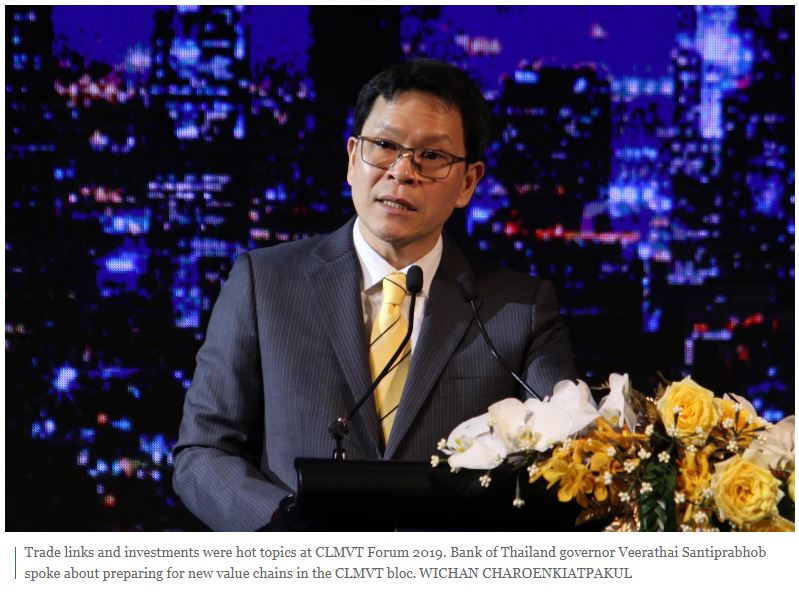Key chance for Asean
Cambodia, Laos, Myanmar, Vietnam and Thailand, or CLMVT, are being urged to expedite seamless connectivity and new value chain development to turn the challenges of the US-China trade war into opportunities.
Speaking at the welcome dinner for the two-day CLMVT Forum 2019 in Bangkok on Sunday night, Kishore Mahbubani, senior adviser and public policy professor at the National University of Singapore, said that while US-China relations in the past have helped strengthen Asean, US-China relations now are pulling Asean apart and forcing the bloc to make a painful decision in the midst of the conflict.
“The current US-China trade war will be a monumental danger affecting Asean more than anything in its 52-year history,” Prof Mahbubani said. “The trade war is just one dimension of the power struggle between the US and China. It’s not just trade but something much deeper. It’s a power struggle with an emerging power, China, taking on the existing number one power, the US.”
He asked whether the real problem is economic or political and pointed out other crucial factors that need to be considered, including military, cultural and emotional dimensions.
“The emotional dimension is the anxiety over the ‘yellow peril’ felt in the West, but it is politically incorrect to speak about it openly, which is another area of complexity more difficult to handle,” Prof Mahbubani said, advising Asean to begin to prepare for the psychological contest by holding further dialogues to work together more closely to overcome the challenges.
Lee Chen Chen, director of policy programmes at the Institute of International Affairs in Singapore, said the ongoing US-China tit-for-tat is more than just a trade war, noting that China is unlikely to back down in the conflict because its national sovereignty and dignity are on the line.
“Asean countries are winners and losers at the same time. The benefits of production shifting out of China existed before the trade war,” she said. “In the long term, the trade war will negatively impact Asean, as the disruption will slow economic growth. Asean will be forced to make a decision. Asean must continue its connectivity roadmap, especially the infrastructure connectivity where there’s still a large gap to fill, and the private sector should play a bigger role addressing the issue.”
Asean should step up promoting itself as a leading production hub in order for the region not to miss the next wave of growth, Ms Lee said, adding that the automotive and high-tech industries, which can generate greater economic value, should be the focus.
The bloc must also be steadfast in upholding free and open trade policies, she said.
Somprawin Manprasert, executive vice-president of Bank of Ayudhya Plc, said the trade war’s effects on Asean will be more critical than in the past.
While there are positive effects from the trade war in terms of alternative markets, the negative impacts are greater because Asean is part of the supply chain for both the US and China and the majority of exports to most countries except the US will be indirectly hurt by the supply chain disruption, he said.
However, opportunities lie in Asean nations working together to make the value chain complement one another, since each member is progressing at different levels of the supply chain.
“We can complement each other very well in the supply chain and we need to talk to each other more,” Mr Somprawin said. “Collaboration is the key.”
Montri Mahaplerkpong, vice-president of the Federation of Thai Industries, warned of the looming threat of regional protectionism and advised the business sector to restructure its product portfolio to prepare for this challenge, especially in the medium and long terms.
He said Asean’s announcement to conclude the Regional Comprehensive Economic Partnership (RCEP) this year is the key message to the US.
Mr Montri said Asean members should act as a group when entering into any international trade negotiations instead of acting alone, notably with talks for the Comprehensive and Progressive Agreement for Trans-Pacific Partnership, which will enable countries to gain more bargaining power.
Asean states should cooperate to find their strengths and focus on what they are good at so that members do not compete with each other.
“If we compete with one another to produce things that are not good enough, we may collapse over the next 10 years,” Mr Montri said. “For example, Cambodia should be positioned as an agricultural processing base, with Laos as the logistics hub or land link, Myanmar focusing on oil and gas, Thailand on automobiles and Malaysia on electronics.”
Bank of Thailand governor Veerathai Santiprabhob said CLMVT’s economic growth, fast technological innovations and mounting geopolitical tensions will lead to dramatic changes in value chains of the future, which will be more regionally concentrated with a higher service component requiring highly skilled workers.
Source: https://www.bangkokpost.com/business/1701204/key-chance-for-asean


 English
English




